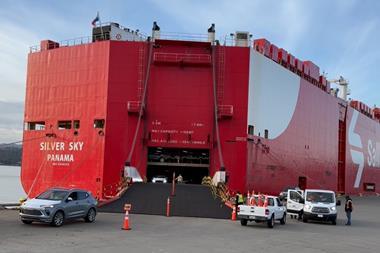 Global maritime logistics providers Kawasaki Kisen Kaisha (K Line), Mitsui OSK Line (MOL) and Nippon Yusen Kabushiki Kaisha (NYK) are integrating their respective container shipping businesses in a new, as yet unnamed, joint venture. The merger includes the companies’ worldwide terminal operations, with the exception of Japan.
Global maritime logistics providers Kawasaki Kisen Kaisha (K Line), Mitsui OSK Line (MOL) and Nippon Yusen Kabushiki Kaisha (NYK) are integrating their respective container shipping businesses in a new, as yet unnamed, joint venture. The merger includes the companies’ worldwide terminal operations, with the exception of Japan.
NYK will own 38% of the business with K Line and MOL each taking a 31% stake. The deal is subject to regulatory approval and is expected to be completed by July 1st next year. The business is expected to get underway by April 1st 2018.
In a joint statement, the companies said the move was in response to the decline in the container growth rate and the influx of newly built vessels, two factors that have contributed to an imbalance of supply and demand in recent years. This imbalance has led to a destabilisation of the container shipping industry and hit profits, according to the companies.
In integrating their respective container shipping businesses, the providers said they aimed to ensure a more stable future and bring greater efficiency and competitiveness to their operations. There has been a rapid increase in the number of mergers and acquisitions in the container shipping business over the last few years.
“By strengthening the global organisation and enhancing the liner network, the new joint-venture company aims to provide higher quality and more competitive services in order to exceed our clients’ expectations,” said the joint statement.
The companies will leverage the scale of their combined vessel fleet, which has capacity for more than 1.4m TEU containers, and said doing so would bring them an “integration effect” of 110 billion Japanese yen ($1.05 billion) annually. The joint venture will take approximately 7% of the global container shipping market.
MOL is currently ranked 11th globally according to fleet scale, with NYK 14th and K Line at 16th. The joint venture will be ranked 7th.
The three companies have been already cooperating on some services through vessel-sharing agreements but said that the joint venture would combine their strengths to create a stronger global competitor.
Maersk Line remains the largest provider of container shipping services with 16% of the market followed by MSC (14%) and CMA CGM, including APL (11%).
Containerised cargo accounts for about 60% of all world seaborne trade, according to analyst firm Statista.



































